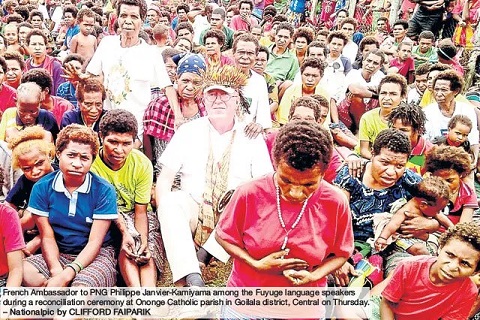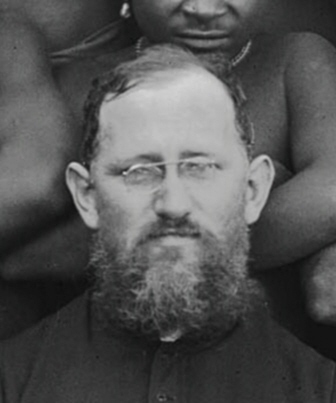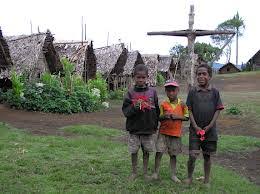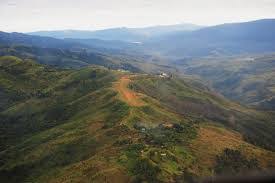Continued interest in the death of Fr Jules Dubuy and details of the recent Goilala reconciliation.

From The National, PNG by Clifford Fairparik
ABOUT 20,000 Fuyuge language speakers in the Goilala district have finally revealed the truth about how French priest Fr Jules Dubey died 68 years ago.
They also sought forgiveness from the French government and the Catholic Church for lying about Fr Jules’ death on Aug 6, 1952.

Fr Jules was a priest of the Order of Missionaries of the Sacred Heart (MSC) of Jesus.
They claimed in a reconciliation ceremony last week that they had not been successful in education and business because they had lied about the death.
They also presented about K240,000 worth of gold nuggets to Bishop Otto Separy of the Bereina Dioceses to express their apology for lying that Fr Jules was buried alive in a tunnel that he was digging at the Ononge Catholic Parish. In fact, their grandfathers had killed him in the tunnel.
The two-day ceremony that started on Wednesday was done with traditional rituals, with the sharing of betel nuts and pig-slaughtering, followed with a mass on Thursday at the Woitape local level government (LLG), Central.

French Ambassador to PNG Philippe Janvier-Kamiyama, Culture Arts and Tourism Minister Emil Tammur, Community Youth and Religion Minister Wake Goi, Goilala MP and Transport Minister William Samb, Bishop Otto, MSC provincial Fr John Willio and retired French priest Fr Albert Boudaut, who was also the last French priest at Ononge Parish, attended the ceremony.
The villagers came from all over the LLG to the Ononge Parish for the ceremony. They had to walk for two days, climbing and descending mountains, crossing swift rivers and sleeping in villages along the way.
During the second day of the ceremony, Udaba Valley paramount chief Casmiro Aia said they were sorry for the killing of Fr Jules.
“We want to say sorry for what our grandfathers did in 1952. We lied that the late Fr Jules was buried alive when the tunnel he was digging caved in,” he said.
“That lie was also recorded in the history books of the work of Catholic Church in PNG.
“But the truth is our grandfathers had killed him in the tunnel and reported that he was buried alive.
“And this lie was passed on and now we want to say sorry and tell the truth.”
Aia said Fr Jules was killed after he reported the killing of his local (sheep) shepherd to the patrol officer (kiap) at Tapini Station.
“The kiap sent a police team to investigate,” Aia said.
“Instead they arrested the chiefs and tortured them by stripping them naked and burning them with firewood in a humiliating manner before the villagers.
“They then took them to jail at Tapini and spent some months there. Upon their release and because the chiefs were humiliated, they plotted to kill Fr Dubey.”
Fr Jules was born in 1887 in Coublanc in France and joined the MSC in 1905 as a Catholic priest.
He came to PNG in 1913 to become the priest of the Ononge Parish.”

FRENCH ambassador Philippe Janvier-Kamiyama spent two nights among the Fuyuge language speakers during a reconciliation ceremony in the mountains of Central last week.
He was moved by the two-day ceremony relating to French priest Fr Jules Dubey’s death at the Ononge Catholic Parish.
Janvier-Kamiyama vowed to set up a Fr Jules Foundation in France with his relatives to strengthen relationship between French people and the Fuyuge-speaking people in the Goilala district.
“I’m happy for the invitation by the Goilala MP William Samb and Fr Jules reconciliation committee to come here,” he said.

Janvier-Kamiyama said it was good for foreign missions to visit remote people.
“The work of a diplomat is not only to stay in his office in Port Moresby and go to Waigani for diplomatic meetings with government officials but also visit remote areas and meet the people to understand their issues,” he said.
“If you stay in Port Moresby, you won’t know about the people.
“And I hope that French people will partner in this district’s development.
“In France, with late Fr Jules’ family, we will start a sister foundation.
“We hope to raise some funds and find solutions because more than one century (since 1884) of the first arrival of French Catholic priests in Bereina Dioceses, your roads are not good.
“You face challenges in accessing health, education and other government services, including economical activities.
“But you are a very courageous, committed and strong people.”
